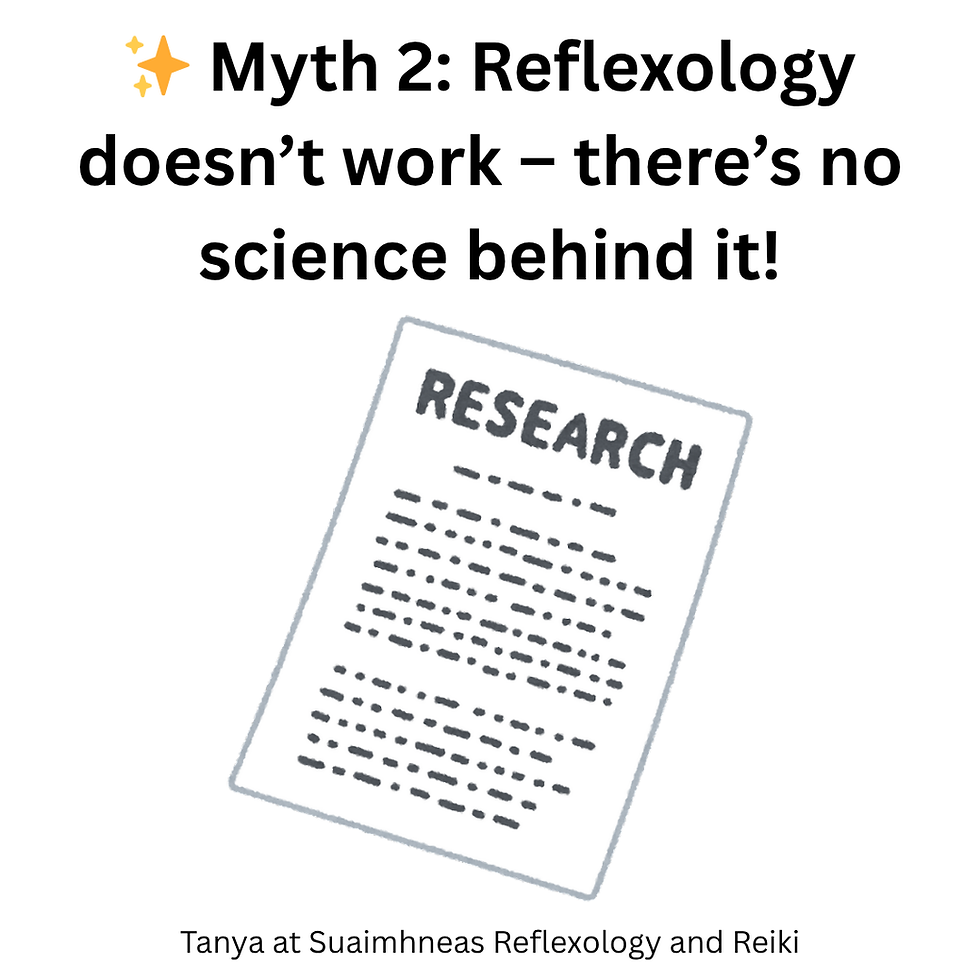Myth 3 – Reflexology is Just a Wellness Fad? Let’s Take a Look Back in Time
- Tanya

- Aug 7, 2025
- 3 min read
In a world filled with ever-changing wellness trends and fleeting fads, it's understandable that people might wonder whether reflexology falls into that same category. But the truth is—reflexology is not just a wellness fad. Its history is long, fascinating, and deeply rooted in both ancient and modern traditions.
Let’s explore where reflexology really comes from and how it has developed into the respected complementary therapy it is today.
🌍 Ancient Origins of Reflexology
Reflexology, or some form of it, has been practised for thousands of years across many cultures. Evidence suggests that foot and hand therapy was used in Ancient Egypt, China, and India as far back as 4,000 BCE.
One of the most well-known examples is a pictograph found in the tomb of Ankmahor (known as the "physician’s tomb") in Saqqara, Egypt, which shows what appears to be practitioners working on the feet and hands of others—an early depiction of reflex-like therapy.
In Traditional Chinese Medicine, similar techniques have been used to balance Qi (energy) and stimulate organ function through specific points on the body, particularly the hands and feet.
🧠 The Emergence of Reflexology in the West
Reflexology as we understand it in the West began to take shape in the early 1900s, thanks to the work of Dr. William Fitzgerald, an American ear, nose, and throat specialist. He developed what he called Zone Therapy—a concept that divided the body into ten vertical zones, each corresponding to areas on the hands and feet. He believed that applying pressure within these zones could affect organs and functions within the same zone.
This was a groundbreaking idea at the time, and it laid the foundation for the reflexology we know today.
👣 The Influence of Eunice Ingham
Perhaps the most pivotal figure in the evolution of modern reflexology is Eunice Ingham, a physiotherapist who worked with Dr. Fitzgerald. In the 1930s, she refined his Zone Therapy into what we now recognise as reflexology.
Eunice believed that congestion or tension in specific areas of the feet reflected similar conditions in other parts of the body. She developed detailed reflex maps of the feet, correlating each part of the foot with a specific organ, gland, or body system.
She travelled extensively to teach and treat, and her books—such as Stories the Feet Can Tell—are still foundational texts in reflexology training today.
📚 Reflexology Today: A Complementary Therapy with Growing Recognition
Modern reflexology continues to be shaped by the work of therapists, researchers, and professional bodies worldwide. Today, it is used in a wide range of settings—from private practice to palliative care units, maternity services, and even cancer support centres.
It is increasingly recognised for its ability to support:
Stress reduction and deep relaxation
Pain management
Hormonal balance
Emotional wellbeing
Sleep and digestive support
Research continues to emerge showing positive outcomes. While more studies are needed, evidence is growing that reflexology positively affects the nervous system, helping shift the body from a stressed state into one of calm and rest.
🧡 In Summary: Not a Fad, But a Footpath Through History
Reflexology is far from a passing trend. It is a practice with ancient roots and a solid modern foundation, shaped by pioneers like Fitzgerald and Ingham, and supported by ongoing research and experience.
So next time someone tells you reflexology is just a wellness fad—you’ll know better. It’s a therapy with a rich history, a meaningful purpose, and a growing role in modern holistic health.
If you’d like to experience reflexology for yourself, or have questions about how it might support you, I’d love to hear from you.
Warm wishes,Tanya x




